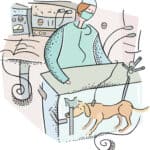Press Release 11/18/21
 MIDDLESEX COUNTY, NJ – The Middlesex County Office of Health Services is reporting that a skunk tested positive for rabies in the Township of Monroe, Middlesex County, in the vicinity of Evergreen Terrace and Astor Place.
MIDDLESEX COUNTY, NJ – The Middlesex County Office of Health Services is reporting that a skunk tested positive for rabies in the Township of Monroe, Middlesex County, in the vicinity of Evergreen Terrace and Astor Place.
This is the eighth rabid animal reported within Middlesex County for 2021 and the first rabid animal in Monroe.
On Wednesday, November 17th, 2021, a resident of Monroe’s pet dog attacked a skunk. When the resident went to grab the dog they slipped and the skunk bit the resident. The animal was picked up by the Animal Control Officer and was then taken to the New Jersey Department of Health Laboratory for testing. It was reported on Thursday, November 18th, 2021 that the animal tested positive for rabies. The resident’s dog is currently vaccinated for rabies and was instructed to follow up with their veterinarian. The resident was notified to consult with a physician regarding rabies post exposure treatment.
The Middlesex County Office of Health Services continues to monitor rabies cases within the municipality. Residents should report wild animals showing signs of unusual behavior to the Police Department. Additionally, it is recommended that residents should avoid contact with wild animals and immediately report any bites from wild or domestic animals to your local health department and consult a physician as soon as possible. Finally, be sure that all family pets are up to date on their rabies vaccinations.
Rabies is caused by a virus which can infect all warm-blooded mammals, including man. The rabies virus is found in the saliva of a rabid animal and is transmitted by bite, or possibly by contamination of an open cut. New Jersey is enzootic for raccoon and bat variants of rabies. Bats, skunks, groundhogs, foxes, cats and dogs represent about 95 percent of animals diagnosed with rabies in the Unites States.
Rabies Prevention Guidelines
The Middlesex County Office of Health Services is advising residents to follow these guidelines to prevent rabies from being transmitted to themselves or their pets:
1. Immediately report a bite from a wild or domestic animal to your local health department. Wash animal bite wounds thoroughly with soap and water as soon as possible after the bite. Contamination of open cuts and scratches with saliva of potentially rabid animals should also be washed off immediately. Consult a physician as soon as possible.
2. Immediately report any wild animals showing signs of unusual behavior. Signs of unusual animal behavior could be that the animal may:
• Move slowly
• May act as if tame
• Appear sick
• Have problems swallowing
• Have an increase in saliva
• Have increased drooling
• Act aggressive
• Have difficulty moving
• Have paralysis
• Bite at everything if excited
Residents should avoid any contact with the animal and call your local animal control officer or local police department.
3. Be sure that all family pets are up to date on their rabies vaccination. If unsure, please call your veterinarian. Call your local health department for free rabies vaccination clinic availability.
4. Animal proof your home and yard. Make sure all garbage containers have tight fitting lids, do not leave pet food or water outside, do not allow rainwater to collect in outdoor containers or equipment and keep yard free of garbage and debris.
5. Do not feed or handle wild animals.
6. Avoid contact with stray animals or pets other than your own.
7. Try to prevent your pets from coming into contact with wild animals.
8. Screen off vents to attics and other areas that could provide shelter for bats






